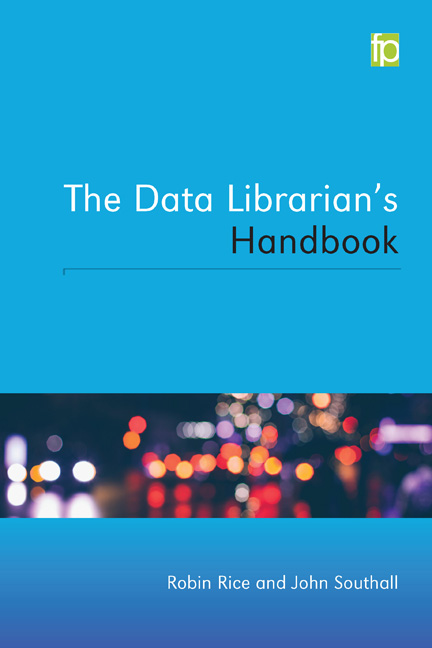Book contents
- Frontmatter
- Contents
- Acknowledgements
- Preface
- 1 Data librarianship: responding to research innovation
- 2 What is different about data?
- 3 Supporting data literacy
- 4 Building a data collection
- 5 Research data management service and policy: working across your institution
- 6 Data management plans as a calling card
- 7 Essentials of data repositories
- 8 Dealing with sensitive data
- 9 Data sharing in the disciplines
- 10 Supporting open scholarship and open science
- References
- Index
5 - Research data management service and policy: working across your institution
Published online by Cambridge University Press: 08 June 2018
- Frontmatter
- Contents
- Acknowledgements
- Preface
- 1 Data librarianship: responding to research innovation
- 2 What is different about data?
- 3 Supporting data literacy
- 4 Building a data collection
- 5 Research data management service and policy: working across your institution
- 6 Data management plans as a calling card
- 7 Essentials of data repositories
- 8 Dealing with sensitive data
- 9 Data sharing in the disciplines
- 10 Supporting open scholarship and open science
- References
- Index
Summary
Librarians and RDM
Many data librarians working today are solo librarians or part of a small team. However, we would argue that for those data librarians who have become involved in work supporting research data management (RDM), working alone is not an option. There are too many components involved in institutional RDM support for one professional to be able to do it all. One parallel trend to employing data librarians in the UK is for academic libraries to hire an ‘RDM services coordinator’. These may be the only full-time professional working on RDM, and their title recognizes the need to leverage input from service managers across the library and computing service, and beyond. In some cases these new posts have been based in the research office, rather than the library. In other cases support has been cobbled together from parts of people's jobs across libraries, research offices and IT departments. A DCC survey from 2015 found that ‘At least two-thirds of [52 responding UK-based] institutions currently have less than 1 [full-time equivalent staff] allocated to RDM’ with only those receiving the top third of research income expected to have more (almost three on average) by May 2016 (Whyte, 2015, 3).
For those without the luxury of being in a dedicated post, taking on data support is often a new job requirement from which none of the previous duties have been removed. While this may cause stress and even resentment for some, it really should be seen as an intellectual challenge and an opportunity to work with new researchers and colleagues outside one's normal circles. Even those in a dedicated data-related post who may be accustomed to serving a specific research community are being challenged to come out of their silos and combine forces with others across campus to join RDM committees and do some collective problem-solving. People skills or communication skills have never been more needed in the data support profession.
Similarly, it may be observed that there are two types of research institutions: those that embrace the RDM challenge proactively, and those that wait for funders’ requirements to threaten research income or other external consequences (such as a scandal involving fraud, confidentiality breach or failure to comply with a freedom of information [FOI] request) before reluctantly taking action.
- Type
- Chapter
- Information
- The Data Librarian's Handbook , pp. 67 - 86Publisher: FacetPrint publication year: 2016



